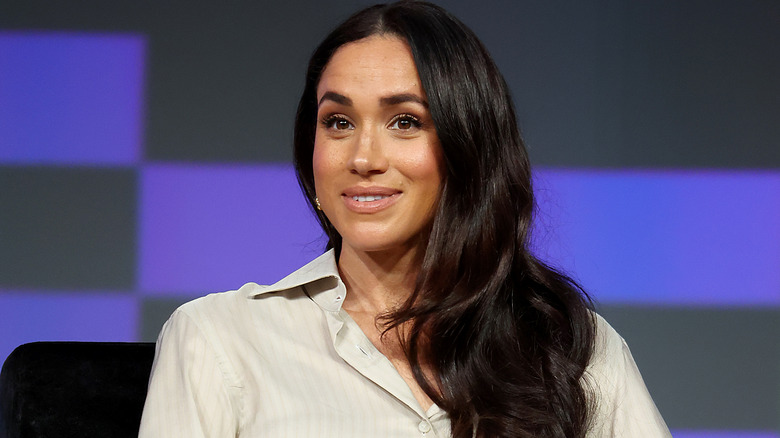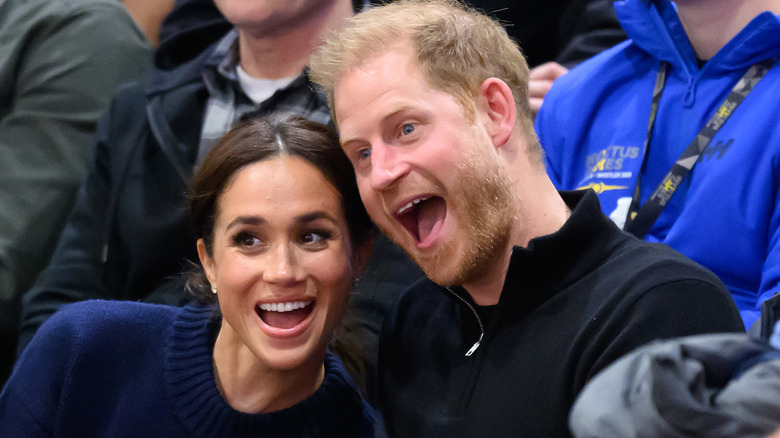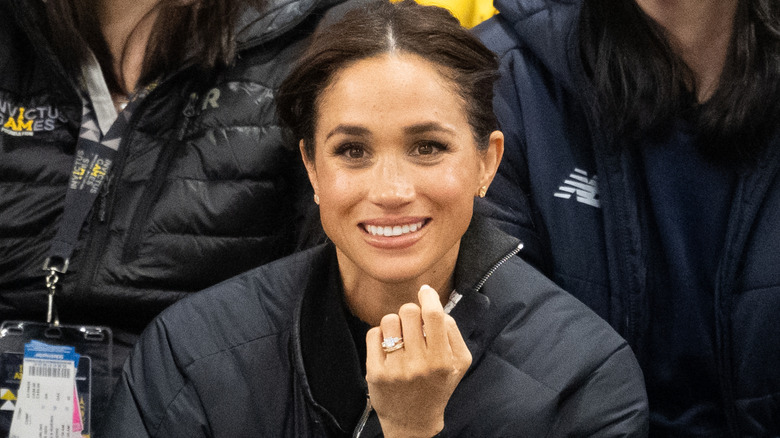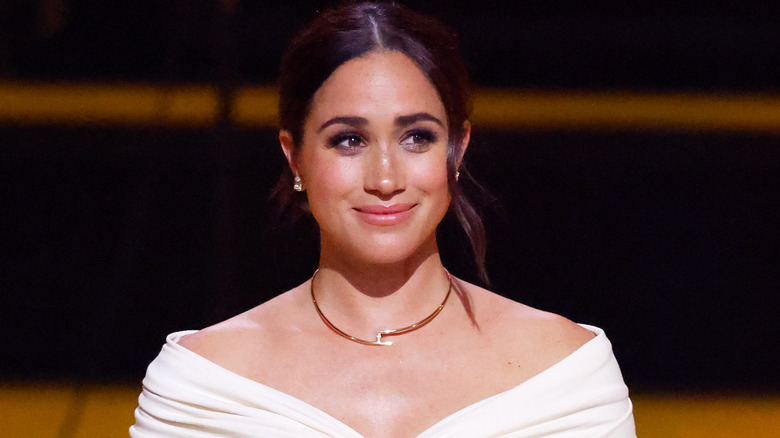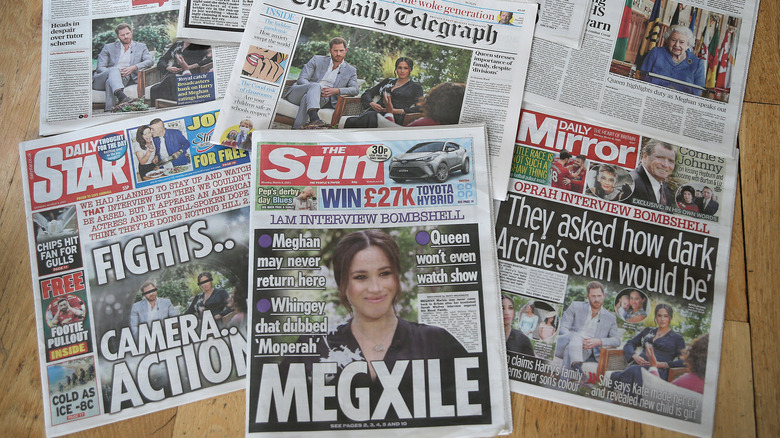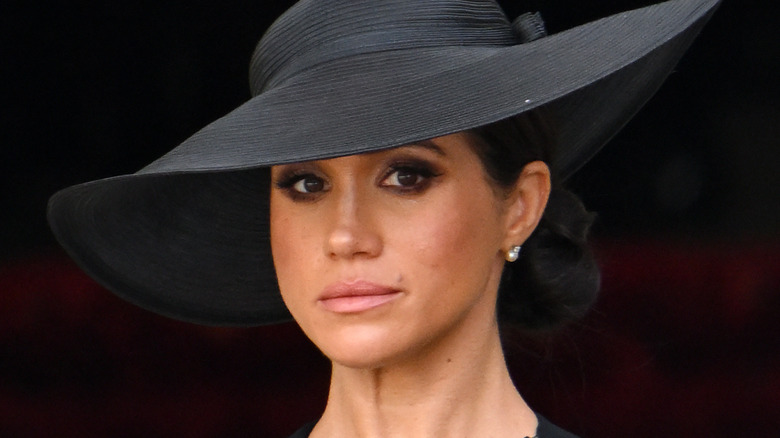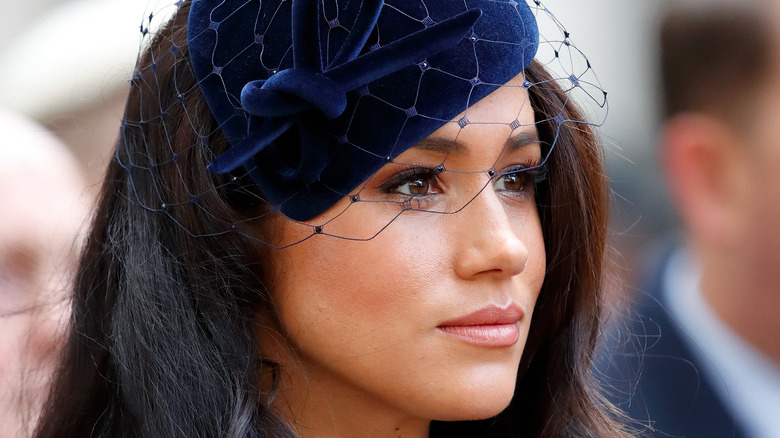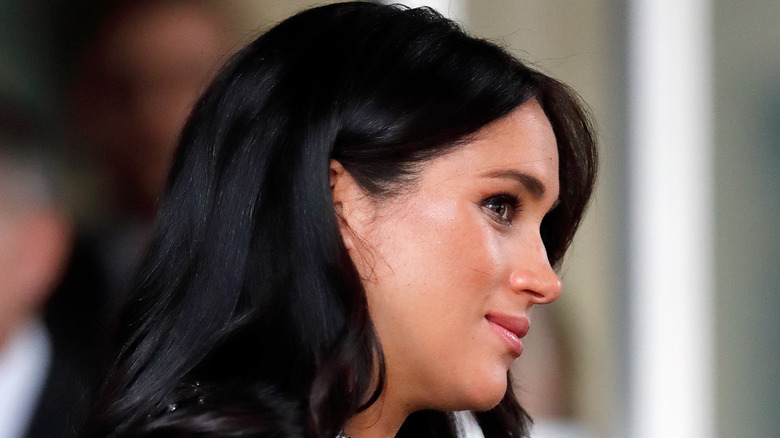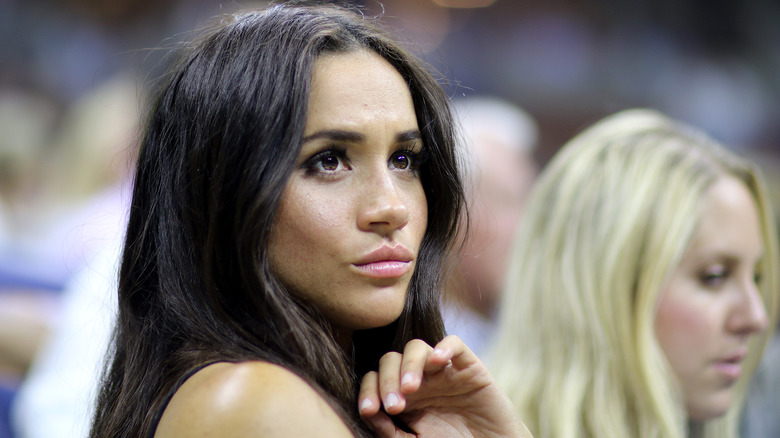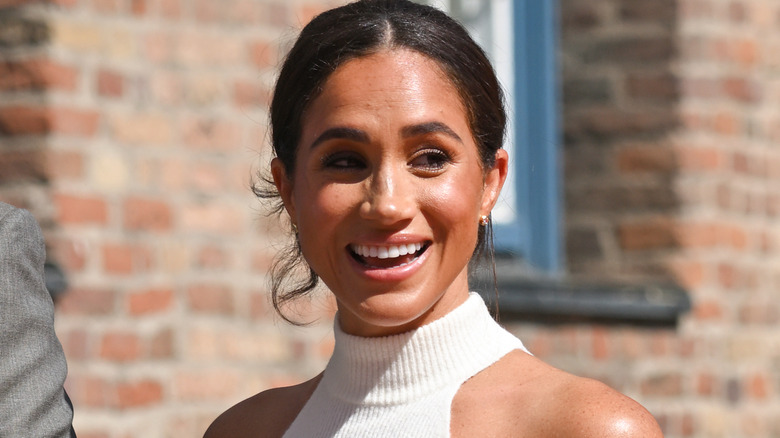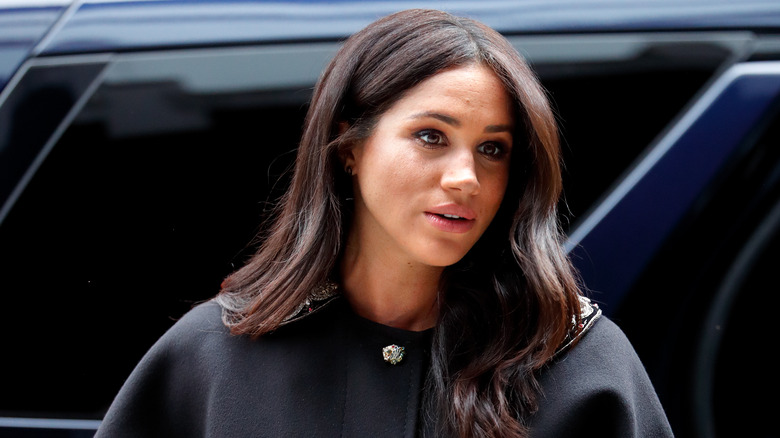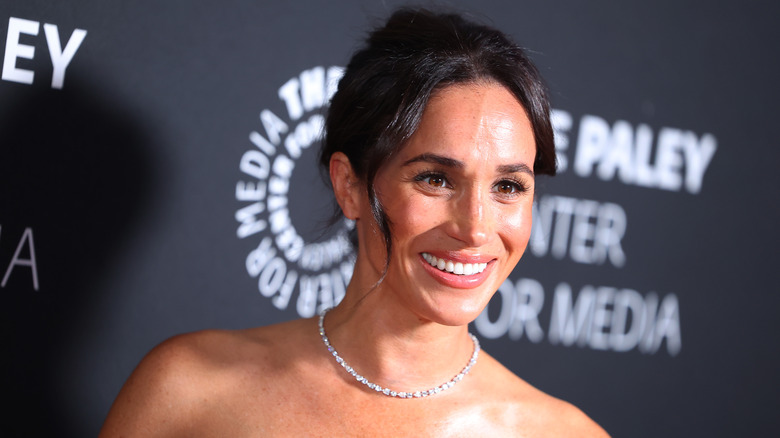Meghan Markle's Image Was Never The Same After The Oprah Interview
This article contains references to mental health and suicide.
Meghan Markle has worked extremely hard to present a specific image of herself to the world, attempting to take control of the narrative from the media. To some, the Duchess of Sussex seems driven by positive public perception, something she curates through photo shoots, TV series, podcasts, and interviews. Perhaps the pinnacle of all this was Oprah Winfrey's 2021 interview with Meghan and her husband, Prince Harry. Oprah, a friend of Meghan's, presented the interview as a two-hour special event, and it certainly was.
However, it was also part of the catalyst for the ongoing ruination of Meghan's public image. More than four years after the interview, and more than five years after Meghan left the U.K., Americans seemed to grow tired of the Duchess. The news that Netflix renewed its contract with Meghan and Harry in August 2025, albeit in a greatly downgraded form, was met with shrugs and frustration. The Independent wrote at the time, "Harry and Meghan's TV deal has been an almighty flop — Netflix is crazy to want more." Returning to her peak of popularity in America, the Oprah interview reveals just how corrupted Meghan's image has become.
Meghan and Harry's popularity from Megxit to Oprah
"Megxit" undoubtedly caused a schism within the royal family, further incensing existing critics of Meghan Markle and Prince Harry. However, believe it or not, Meghan and Harry's decision to step back from royal life was generally received positively. A plurality of people in the U.K. were even rooting for Meghan. Polling by YouGov from early January 2020 reveals that 45% of people in Great Britain supported the move and 26% opposed it, with 29% unsure. In the United States, where there was no monarchic bias either way, Harry and Meghan's move was even more popular. When YouGov conducted the same poll in the U.S., 50% of people approved of their decision and only 7% opposed it, with 43% not knowing or unsure.
It didn't take some Americans that long to form a negative opinion of Harry and Meghan after they officially moved to the U.S. in June 2020. By February 2021, just a few weeks before their infamous interview with Oprah Winfrey, 29% of people polled by YouGov had a very or somewhat unfavorable view of Meghan, with 23% feeling that way about Harry. This means that the Duke and Duchess of Sussex were both still broadly liked in America, but that signs of "Meghan fatigue" were beginning to show.
Bullying rumors dropped right before Oprah
Anticipation was high leading up to Meghan Markle and Prince Harry's interview with Oprah Winfrey on March 7, 2021. However, just five days before the interview, The Times (London) published leaked emails and other reports of allegations that Meghan had been abusive to staff, something which would certainly cloud the way she was perceived in the Oprah interview for some viewers. The Times' reporting strengthened one of the most scandalous rumors about Meghan: that she was an outright bully.
The Times presented an October 2018 email, which supposedly came from Meghan and Harry's communications secretary at the time, Jason Knauf. The email was said to follow conversations with Samantha Carruthers, the head of human resources at Buckingham Palace. "I am very concerned that the Duchess was able to bully two PAs out of the household in the past year. The treatment of X was totally unacceptable," wrote Knauf in the email. "We have had report after report from people who have witnessed unacceptable behavior towards Y."
Knauf's concerns never led anywhere. A source told The Times that Harry begged Knauf to end his pursuits, something lawyers for the Duke and Duchess of Sussex denied. The Times quoted another source as saying, "The institution just protected Meghan constantly. All the men in grey suits who she hates have a lot to answer for, because they did absolutely nothing to protect people."
Meghan dropped some bombshells with Oprah
Oprah Winfrey's interview with Meghan Markle and Prince Harry immediately became a worldwide event. More than 49 million people across the world watched the two-hour special, with the majority of viewers in the United Kingdom and the United States.
The interview found Meghan and Harry making some bombshell revelations, several of which would later be contested. They claimed that they had been privately married three days before their public wedding; they accused the royal family of making racist remarks; Meghan alleged that the royals prevented her from seeking help when she was struggling with mental health; Meghan denied she made Princess Catherine cry, with Meghan claiming the opposite happened at her wedding. Harry insisted that he was the one who initiated "Megxit" and that his family barely speaks with him. Meghan also stated she was prevented from leaving the palace and had to relinquish her passport.
Indeed, the bullying accusations changed the way that some people (especially in the U.K.) saw the interview, leading them to question the veracity of her claims. For some viewers, it reinforced negative feelings about the royal family and why they still exist in the 21st century; after the interview, "Abolish the Monarchy" began trending on Twitter.
Meghan melted down the U.K. media
Reactions to the interview differed greatly between U.S. and U.K. audiences and outlets, revealing the wide disparity in how Meghan's image was perceived at the time. Her comments incensed the U.K. media and dominated coverage. The day after the interview, 30 of the 31 top stories on The Daily Mail's homepage were devoted to largely negative articles on Harry and Meghan. The Sun wrote, "Meghan Markle may never return to Britain after angering Royal Family with bombshell Oprah interview." The Telegraph even compared the couple unfavorably to Edward VIII and Wallis Simpson; Edward famously abdicated to be with Simpson, and the two lived in exile (after meeting with Adolf Hitler in 1937).
British broadcaster Piers Morgan had a massive fit over the Oprah interview on "Good Morning Britain." "I don't believe a word she says. I wouldn't believe her if she read me a weather report," said Morgan the day after Meghan's interview (via CNN). His angry rants prompted pushback from his co-host, who said, "Listen to yourself! ... What's wrong with you? Stop having a go at them all the time!" The next day was even more explosive on "Good Morning Britain," with Morgan simply walking off set during a heated argument. ITV quickly announced that they and Morgan had parted ways.
Americans empathized with Meghan's mental health
Meghan Markle and Prince Harry's criticism of the royal family essentially ruined their reputation in the United Kingdom, with polling revealing that for the first time ever in the country, Harry was viewed unfavorably. Meanwhile, only three in 10 people in the U.K. who were polled by YouGov (via Reuters) viewed Meghan positively, with 58% of respondents having an outright negative opinion of her. Many Americans were still fascinated by the royal immigrants, though, with a post-interview snap poll from YouGov showing that 68% of U.S. citizens were sympathetic toward Meghan and Harry.
The social listening platform Relative Insight went through 40,000 tweets from the week after the Oprah interview, and the results revealed just how much more empathetic U.S. viewers were than U.K. audiences. American social media users were much more likely to use words like "brave" and "strong" to describe Meghan and the interview. Meghan's confession about her declining mental health while living at the palace struck a chord with the U.S. media. Positive headlines flooded the press, such as Newsweek's "Mental Health Experts Praise Meghan Markle for Revealing Suicidal Thoughts". Even the White House press secretary at the time, Jen Psaki, said (via Business Insider), "For anyone to come forward and speak about their own struggles with mental health and to tell their personal story — that takes courage. That's certainly something the president believes."
Fact-checkers investigated Meghan's Oprah interview
With her Oprah Winfrey interview, Meghan Markle presented the image of a misunderstood and victimized woman who, with the help of her Prince Charming, rose above her challenges and is thriving with a new lease on life. Many people, especially Americans, believed that image, but others had doubts from the start. Journalists began digging into the comments Meghan made in the interview to verify their validity. After some fact-checking, the accuracy of Meghan's truths came under fire.
"I haven't left the house in months," Meghan said in the interview. "I've left the house twice in four months." This claim, and another that Meghan had to turn over her passport to royal aides, was quickly dismantled. "Could it really be true that she only left the house twice in four months when she managed to cram in 73 days' worth of engagements, according to the Court Circular, in the 17 months between her wedding and the couple's departure to Canada?" wrote Camilla Tominey for The Telegraph. The extent of Meghan's public engagements also called into questions her claims that she had been "silenced." Tominey also questioned, "How the Duchess had managed to undertake four foreign holidays in the six months after her wedding, in addition to official tours to Italy, Canada, and Amsterdam, as well as embarking on a lengthy honeymoon, if she had 'turned over' her passport?"
Did Meghan Markle mislead Oprah?
Once a few of Meghan Markle's claims from the Oprah Winfrey interview had been contested, cracks began to form in her public image, and the dam was about to blow. It wasn't long before several more of her accusations were deconstructed. For instance, Meghan claimed that she and Harry had been married by the Archbishop of Canterbury three days before their public wedding. The archbishop, however, denied that he had legally married them.
Meghan also claimed that she had little knowledge of Harry before their "blind date," not even looking him up on the internet. On the contrary, royal biographer Andrew Morton, in his book "Meghan: A Hollywood Princess," quotes a childhood friend as saying Meghan was "always fascinated by the royal family" and "wants to be Princess Diana 2.0" (via ABC). Omid Scobie and Carolyn Durand, the authors of "Finding Freedom," wrote in the book (which Meghan provided information for), "Naturally, both participants in this blind date did their homework with a thorough Google search" (via The Sun).
When Oprah asked about Meghan's half-sister Samantha's tell-all book about their relationship, Meghan responded, "I think it would be very hard to tell-all when you don't know me." She claimed that she hadn't seen Samantha in 18 or 19 years. However, Samantha told Inside Edition (via Fox News), "We've got photographs over a lifespan of us together. So how can she not know me?" She showed photographs of her and Meghan together from 13 years prior.
Meghan and Harry moved from Quibi to Netflix
By the time of the big interview, Meghan Markle and Prince Harry had inked some major deals with Spotify and Netflix, although they hadn't actually produced anything by that time. However, they told Oprah that they had never planned to get involved with TV productions when they moved to America; "The Netflix and the Spotify, they're all ... that was never part of the plan," Prince Harry said in the interview. This was contradicted by reports a few weeks after the interview stating the couple had a series of meetings with the now-defunct streaming service Quibi in 2019. A source told The Telegraph, "A lot of it was orchestrated by Meghan's people in America. It was a bit of a secret squirrel."
Instead, the Duke and Duchess of Sussex inked a deal with Netflix worth $100 million, according to some. It took quite a while for anything to come to fruition, with the docuseries "Harry & Meghan" finally being released in December 2022. It was massively popular, but possibly as a hate-watch; Meghan's image had been seriously tainted by this point. The Guardian review was partly titled "So Sickening I Almost Brought Up My Breakfast," calling it a one-sided PR effort. While the series was an attempt to control the couple's narrative, it didn't seem to work. By the end of the year, Meghan is included alongside Donald Trump and Kanye West in a Politico article originally called "Is 2022 the Year We All Finally Got Over Narcissists?"
Meghan began to lose America's sympathy
Any good will that Meghan Markle may have generated from the Oprah Winfrey interview in America had mostly dissipated by the end of 2022. Between her misleading claims being debunked, her Netflix series being lambasted, and her sole Spotify production, "Archetypes," landing with a thud after a $20 million contract, Newsweek was ready to declare, "Meghan Markle Is Losing America's Sympathy." Different outlets that had previously been in Meghan's good graces were ready to get critical. In a piece for Variety, Andrew Wallenstein wrote, "At some point, even the dimmest of minds among their fans is going to tire of their 'Oh, woe is us' routine ... That's a tone-deaf message to be sending from their posh Montecito estate at a time of economic insecurity around the world."
The Cut was another favorite outlet of Meghan's, and they weren't afraid to make fun of the Duchess in their August 2022 cover story; that interview with her was their most-read article in 2022. Author Allison P. Davis revealed that, "[Meghan] sometimes converses like she has a tiny Bachelor producer in her brain directing what she says (at one point in our conversation, instead of answering a question, she will suggest how I might transcribe the noises she's making.)" Meghan's public image was only going to look worse in 2023.
2023 was a year of Meghan mockery
2023 was a year of public embarrassment for Meghan Markle, right on the heels of Politico and other outlets lumping her in with Donald Trump and Kanye West as a "narcissist." Jokes about Meghan's desire for privacy had become a meme, with the Duchess telling Oprah Winfrey in 2021, "I think everyone has a basic right to privacy. Basic. We're not talking about anything that anybody else wouldn't expect." The release of Harry's book "Spare" at the beginning of 2023 hurt their approval ratings by juxtaposing this narrative. It seemed odd to many that anyone would release intimate, tell-all books and TV series about themselves if they wanted any modicum of privacy.
A February 13, 2023, episode of "South Park" was even largely devoted to mocking the Duke and Duchess of Sussex. "The Worldwide Privacy Tour" episode depicted the couple as they furiously sought privacy, all while gaining attention through ridiculous means (Meghan protests with a sign that reads, "Stop Looking at Us"). Meghan's character describes herself in the show as "sorority girl, actress, influencer, victim." The Independent wrote at the time, "It makes it clear that [Harry and Meghan] have turned themselves into a joke, both in their old home and their new one." By the third quarter of 2023, Meghan was only liked by 32% of Americans, according to a YouGov poll (via Newsweek).
Meghan's was accused of being a grifter
Alongside "South Park," the most brutal criticism of Meghan Markle and Prince Harry came from popular podcaster Bill Simmons, who was also Spotify's head of podcast innovations. He said (per Variety), "'The F***ing Grifters.' That's the podcast we should have launched with them. ... Nobody cares what you have to say about anything unless you talk about the royal family and you just complain about them." Apparently, Meghan and Harry's time at Spotify created some enemies and further soured the image they'd tried to repair with their Oprah interview. Vanity Fair delved into the production of Meghan's "Archetypes" podcast, painting a picture of Meghan as egocentric, mean, and irresponsible. "She's just very aware of where everybody is on her board. And when you are not in, you are to be thrown to the wolves at any given moment," a source told Vanity Fair.
Some people still maintained that the real reason Meghan's image had become so damaged was simply due to racism. A columnist for The Baltimore Banner told NPR, "The real reason is I'm going to say racism and jealousy that is couched in racism and a little classism and just, you know, basically being mad that people have things that we might want that we don't have. And then racism." By 2023 and 2024, however, many commentators argued that race alone could not explain her declining popularity.
Meghan's image has soured in America
In many ways, the Oprah Winfrey interview marked the peak of favorability for Meghan Markle in America, presenting perhaps her most likable image. However, it also caught her in a trap of her own making, with many of her claims being unsubstantiated. It also revealed that people are only interested in Meghan if it's royal-related. The more that Americans got to know her, the less they seemed to care. As a Daily Express headline from August 21, 2025, reads, "Meghan Markle 'Disliked Intensely' in America."
Ingrid Seward, Majesty magazine's editor-in-chief, told Fox News, "She's disliked intensely by a large number of the monarchists [in the U.K.]. They see her as being very ... damaging to the royal family. And also, I think a lot of people in America feel the same. They don't like that Meghan [reportedly] dissed her husband's family and dissed her own family." David Christopher Kaufman titled his piece in The Telegraph, "We Americans are fed up with Meghan Markle. It's time for Brits to take her back." That seems unlikely, considering the fraught relations between them and the official royal family. If Meghan thinks the press were hostile when she lived in the U.K., returning now would make that look like a walk in the park.
If you or anyone you know needs help with mental health or managing suicidal thoughts, contact the relevant resources below:
-
The Crisis Text Line by texting HOME to 741741, call the National Alliance on Mental Illness helpline at 1-800-950-NAMI (6264), or visit the National Institute of Mental Health website.
-
Call or text 988 or chat on 988lifeline.org.

